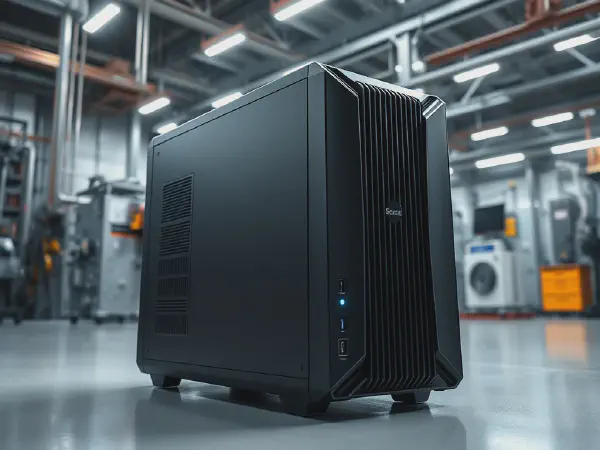Discover the Advantages of Fanless Industrial PCs

Fanless Industrial PCs: An Overview
Fanless Industrial PCs are specialized computing devices designed to operate reliably in demanding industrial environments without the use of mechanical cooling fans. Utilizing advanced thermal management systems, these PCs are able to channel and dissipate heat effectively, ensuring optimal performance in diverse applications such as automation, transportation, medical equipment, and more.
The transition from traditional fan-cooled industrial computers to fanless designs has gained traction over recent years, primarily due to the benefits they offer in terms of reliability and maintenance. By eliminating the need for fans, manufacturers of Fanless Industrial PCs minimize the risk of dust accumulation and mechanical failure, which are common issues in rugged industrial settings. Moreover, their compact designs make them suitable for space-constrained environments.
Using a pdf temperature data logger can significantly enhance your ability to monitor critical temperature data in real-time.
Fanless Industrial PCs are engineered to endure harsh conditions, such as extreme temperatures, vibrations, and humidity. This durability is essential for applications in sectors like manufacturing, transportation, and energy, where downtime can lead to significant financial losses. Beyond durability, these systems typically provide improved energy efficiency, making them an environmentally friendly option for various operations.
The reliability of an industrial pc ensures uninterrupted operations in demanding manufacturing environments.
The performance of Fanless Industrial PCs is comparable to their traditional counterparts, thanks to advancements in technology, including the use of solid-state drives (SSDs) and compact processors. Additionally, their passive cooling technology often results in lower noise levels, creating a more pleasant working environment, especially in facilities where quiet operation is essential.
In this article, we will delve deeper into the benefits, applications, comparisons with traditional PCs, key features, and future trends surrounding Fanless Industrial PCs, providing a comprehensive understanding of what these systems have to offer for today's industrial demands.
Businesses harness the power of esis software to streamline their processes and improve overall operational efficiency.
Benefits of Fanless Industrial PCs
One of the primary advantages of Fanless Industrial PCs is their enhanced durability. Unlike traditional PCs that rely on fans for cooling, fanless designs utilize heat sinks and thermal conduction, allowing them to operate in temperatures ranging from -40°C to 85°C. This robustness is vital for environments plagued by dust, moisture, and temperature extremes.
Another significant benefit is the lower noise levels produced by Fanless Industrial PCs. The absence of mechanical components not only reduces noise but also creates a more conducive work environment, particularly in settings like hospitals, libraries, or offices where noise control is critical.
Fanless Industrial PCs also offer reduced maintenance requirements due to the absence of moving parts. Mechanical failure often stems from fan malfunctions, resulting in costly downtime and repairs. As fanless units eliminate this risk, they typically require less frequent servicing and tend to have a longer operational lifespan.
Improved energy efficiency is another compelling advantage of Fanless Industrial PCs. With no fans consuming power, the overall energy usage is minimized, leading to lower operational costs and a smaller carbon footprint, making these systems an eco-friendly choice.
Lastly, Fanless Industrial PCs are designed for the longest lifespan in industrial applications. Their rugged design ensures they can withstand the rigors of various industrial operations, resulting in a favorable return on investment (ROI) through extended use and reduced replacement costs.
Applications of Fanless Industrial PCs
Fanless Industrial PCs find extensive use in factory automation and control systems, where reliability and continuous operation are paramount. They can monitor processes, control machinery, and perform data acquisition without the risk of overheating.
In transportation monitoring systems, fanless designs are deployed to track and analyze real-time data, including GPS positioning, traffic conditions, and environmental sensors, ensuring efficient operations in the logistics and transportation sectors.
These PCs are also integrated into medical equipment, such as diagnostic machines and patient monitoring systems. Their silent operation and reliability make them suitable for hospitals and clinics that require high-performance computing without disturbing patient care.
In the oil and gas industries, Fanless Industrial PCs play a critical role in monitoring drilling operations, processing data in real-time, and ensuring safety measures are implemented in harsh environments where traditional PCs might fail.
Lastly, they are commonly used in retail for point-of-sale terminals. Their compact and robust design makes them ideal for checkout systems that demand continuous operation while maintaining a sleek appearance in customer-facing areas.
Comparing Fanless vs. Traditional Industrial PCs
When comparing Fanless Industrial PCs to traditional industrial computers, one primary distinction lies in temperature control and heat dissipation methods. While traditional models rely on active cooling through fans, fanless systems use passive cooling methods, which significantly reduce the chances of failure due to overheating.
In terms of performance metrics, Fanless Industrial PCs can deliver comparable or superior processing capabilities to traditional PCs. Advanced components and optimization techniques make them suitable for demanding applications without compromising speed or efficiency.
Cost-effectiveness is another crucial area of comparison. Although Fanless Industrial PCs may have a higher initial purchase price, their reduced maintenance, lower energy consumption, and extended lifespan lead to cost savings over time, making them a financially savvy investment for many businesses.
Size and form factor are also important considerations. Fanless systems often feature compact designs that save space and offer more flexible installation options compared to bulkier traditional PCs, which can be a significant advantage in space-constrained environments.
Lastly, ease of installation is a benefit of Fanless Industrial PCs. With fewer components and more extensive compatibility with modern mounting solutions, they simplify the setup process, ensuring quicker deployment in various applications.
Key Features of Fanless Industrial PCs
The use of passive cooling technology is a hallmark feature of Fanless Industrial PCs, allowing reliable operation without fans. This technology prevents overheating in environments with high ambient temperatures, ensuring longevity and performance stability.
Fanless Industrial PCs often incorporate solid-state drives (SSDs) for faster performance, enhancing data access speeds compared to traditional hard drives. This results in quicker boot times and more efficient data handling, crucial for time-sensitive tasks.
Multiple connectivity options are another defining feature of Fanless Industrial PCs, providing sufficient ports for various peripherals and networking configurations, which are essential for modern industrial applications where integration is key.
Their compact designs not only enable better space management but also facilitate easier physical integration into existing infrastructures, making them a versatile option in numerous industry settings.
Lastly, robust construction with materials designed to withstand extreme working conditions ensures that Fanless Industrial PCs maintain high reliability and performance in some of the toughest environments faced by any industrial operation.
Future Trends in Fanless Industrial PC Technology
Advancements in cooling solutions continue to drive the evolution of Fanless Industrial PCs. New materials and designs are emerging that enhance passive cooling capabilities, allowing these devices to operate effectively even in hotter environments.
The integration of AI and machine learning capabilities stands out as a significant trend shaping the future of Fanless Industrial PCs. These technologies can improve data processing, predictive maintenance, and automation, making them invaluable tools in industrial settings.
An increase in Internet of Things (IoT) applications is also influencing the development of Fanless Industrial PCs. These systems are becoming central to connected industrial operations, where data analytics and real-time monitoring are crucial.
Moreover, sustainability and green technology applications are driving demand for energy-efficient computing solutions. Fanless Industrial PCs align with these initiatives by reducing energy consumption and carbon footprints in operations.
Finally, the emergence of new industry standards concerning efficiency, connectivity, and compatibility will likely reshape the landscape for Fanless Industrial PCs, pushing manufacturers to innovate continually and address the evolving needs of industrial users.
